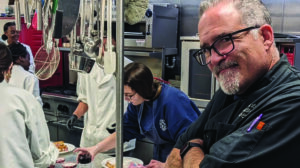In 2009, El Paso County had its worst outbreak of skunk rabies in 40 years. At least eight rabid skunks were found in the county, which had been free of skunk rabies since 1970.In addition to the eight rabid skunks, at least one cow and one horse developed rabies symptoms and required euthanasia. Post-mortem tests confirmed both had rabies.Dr. Bernadette Albanese, medical director of the El Paso County Department of Health and Environment, said she is worried the outbreak will be worse this year.Albanese said her department saw plenty of skunk rabies throughout the winter ñ a time that should have been relatively quiet.”Now skunks are getting more active as they’re starting to breed, with more potential for skunk-to-skunk rabies transmission,” she said. Three rabid skunks have already been found this year, she added.Albanese urged owners of dogs, cats and ferrets to get their pets vaccinated for rabies immediately, before people and pets start spending more time outside.”Here’s the scenario we’ve seen too many times: People go outside; they see their dog in a fight with a skunk, they pull their dog away and the skunk bites everybody,” she said.Once an animal is infected with rabies, it may take six months for it to exhibit symptoms, making early diagnosis difficult. There is no treatment for rabies in non-humans, so the animal will eventually die.”But before the animal dies, it may expose lots of people to rabies,” Albanese said. “It may expose children; it may expose your neighbor’s family, relatives or friends you have visiting; or, worse yet, the animal could get loose. Now we have an animal with rabies running around a neighborhood.”The best prevention is to vaccinate all mammalian pets, but Albanese warned against pet owners administering the rabies vaccine themselves.”When we’re evaluating exposures, we only count rabies vaccines that have been given by a licensed veterinarian,” she said.If someone who is not a veterinarian vaccinates a pet and it’s bitten by a rabid animal, the county will still euthanize the pet ñ the vaccine loses its potency if it’s not stored at all times within a specific temperature range.”When you get the vaccine through a licensed veterinarian, you’re pretty much guaranteed the temperature of the vaccine has been properly maintained coming from the manufacturer to the distributors to the vet’s office and into your pet,” Albanese said.She encouraged livestock owners to have their livestock vaccinated by a veterinarian, too.”Vets know what vaccine is appropriate for which animal and how to boost the vaccine of an animal that’s already been vaccinated. We’d like people to establish relationships with their vets, not only for general animal and pet health but to get a proper rabies vaccine,” she said.Untreated rabies in humans is always fatal, but at least there’s a treatment.”The treatment costs several thousand dollars for the average adult, and insurance companies don’t always cover it.” Albanese said. ìIt takes a month and at least six shots to get protected. That’s not an effective way to control rabies.”According to the Centers for Disease Control, humans die from rabies in the United States when they fail to seek medical assistance, often because they’re unaware they’ve been exposed. Death usually occurs within days of the onset of symptoms, when treatment is too late, but symptoms may not be apparent for up to six months.There’s a human vaccine for rabies, but it’s usually only administered to people like veterinarians and wildlife officials who come in contact with animals capable of carrying rabies.The CDC defines rabies as a viral disease that affects the central nervous system and brains of mammals ñ not birds, fish, amphibians or reptiles.The CDC Web site states that before 1960, the majority of rabies cases occurred in domestic animals. Now, more than 90 percent of all cases occur in wildlife. The number of human deaths attributed to rabies per year has declined from more than 100 in 1900 to one or two today.”Rabies is a very, very serious and fatal disease. We do not want to see a human get rabies in our county,” Albanese said.Although many of the rabid skunks were found in the east part of the county, she said they believe the entire county is at risk.”It’s so abnormal to have so much [skunk rabies] right now that a skunk issue anywhere in the county is going to raise issues,” she said, adding that skunk rabies has hit El Paso County particularly hard.Colorado Division of Wildlife spokesman Michael Seraphin said skunk rabies has been advancing westward across the plains from the Kansas-Colorado border for the past couple of years.”We don’t have a great explanation for why all of a sudden we’re getting inundated with an epidemic of skunk rabies, but I can tell you it’s not going to go away any time soon,” Albanese said.”We’re pet lovers in this county, and pets that go outside are more likely to come in contact with a skunk than people. We’re more likely to be exposed to rabies through unvaccinated pets, especially if people don’t quickly recognize rabies symptoms.”So protect yourself, your family and your pets by getting your pets vaccinated.”






